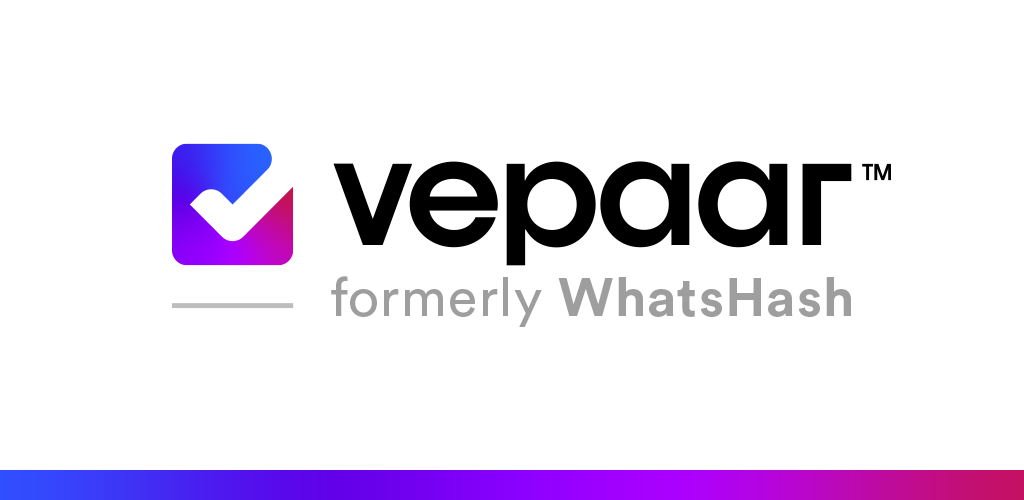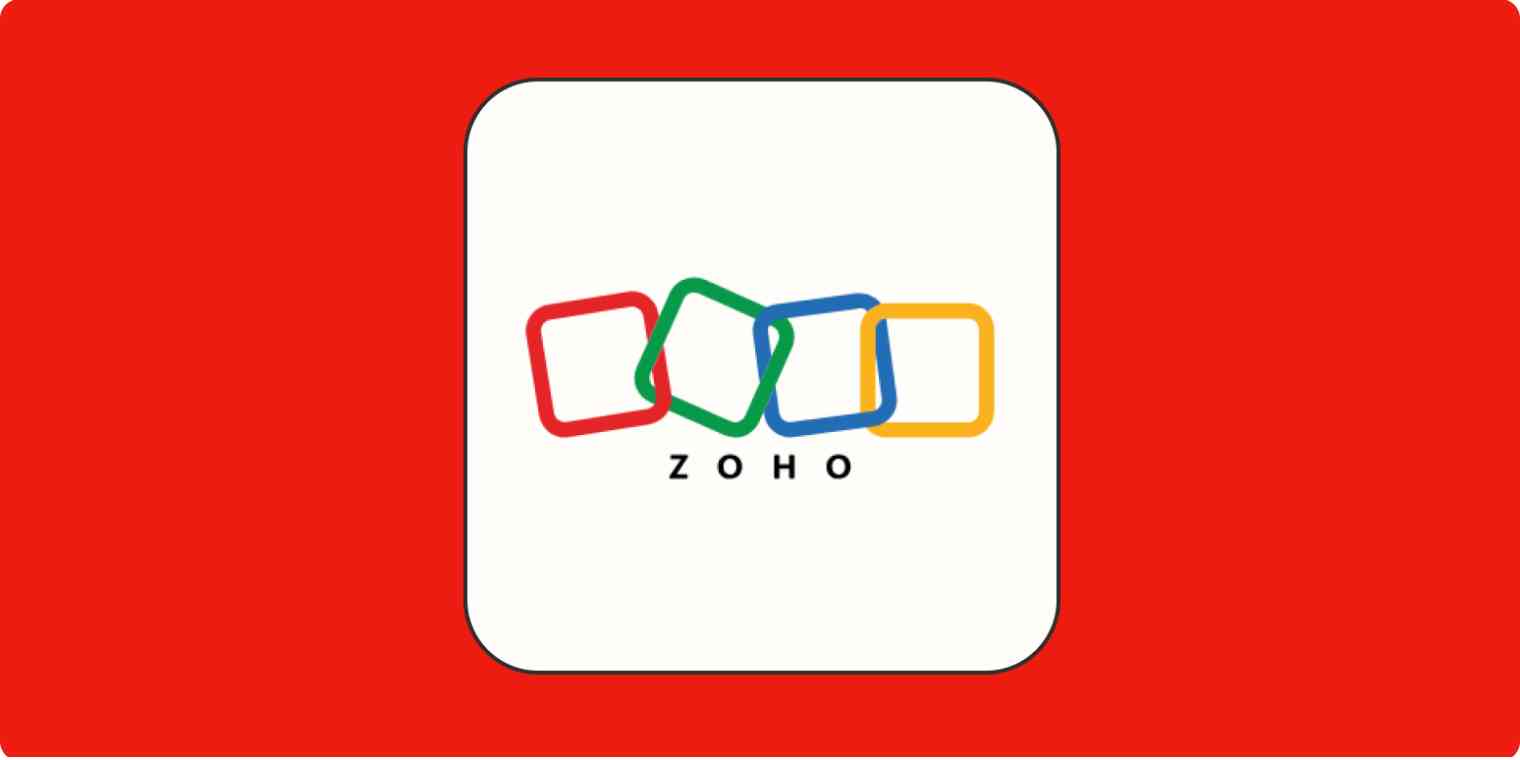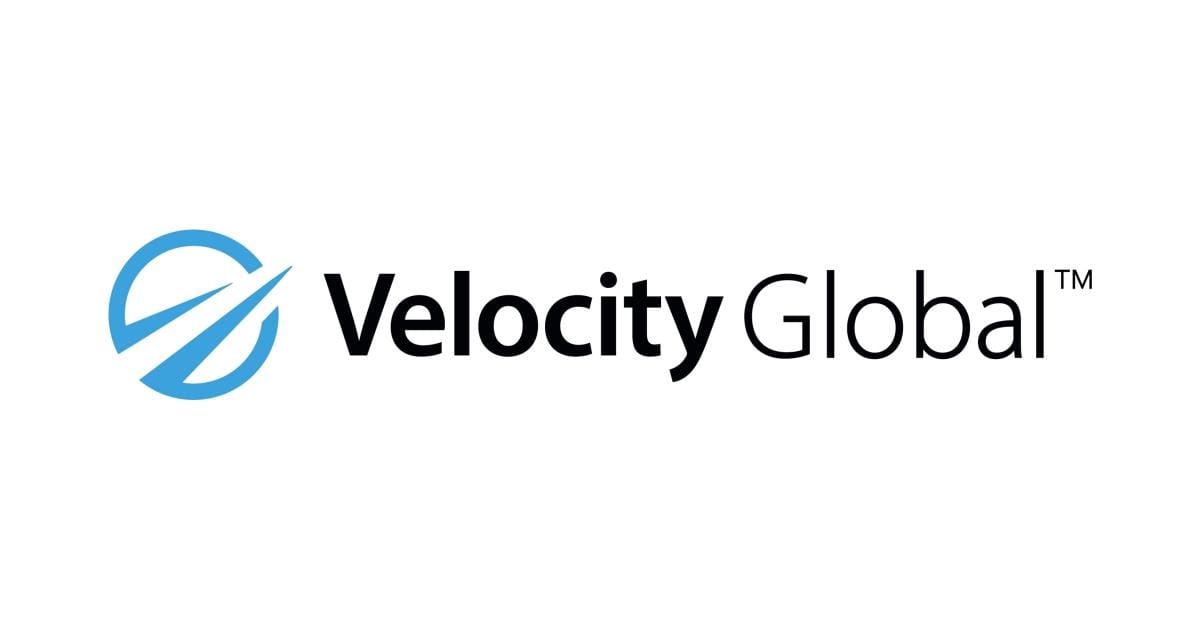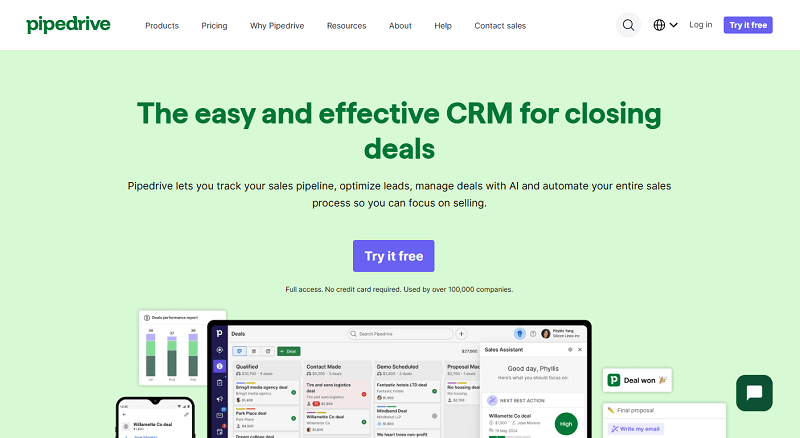With the rise in competition in the telecom industry, staying ahead of the game is critical. Telecom firms are shutting down because of customer attrition and higher expectations for flawless service. Using customer relationship management (CRM) systems is a key strategy for telecom companies to grow.
CRM has become more than a tool; it is a game changer for improving customer experiences and generating revenue.
It also plays an important role in the telecom industry. This is because of the many data points and regular client interactions.
However, to provide personalized service for your clients, we’ve curated the ten best CRMs for telecom industry.
Table of Contents
What is CRM for Telecom?
Customer relationship management (CRM) is a tool telecom businesses use to manage communications with present and future clients. CRM helps telecom companies improve service and boost sales. It also automates daily tasks, like managing contacts and generating reports.
In addition, telecom CRM software unifies information from multiple touchpoints into a single platform, including network usage, marketing channels, invoicing systems, and customer service. This gives telecom businesses a 360-degree perspective of their clients and facilitates more individualized communications and services.
Features to look for in a CRM For Telecom
To meet the industry’s specific needs, a telecom CRM solution must have the following features:
• Omnichannel Integration: The ability to combine all consumer touchpoints, including phone, email, social media, and physical storefronts, provides a uniform customer experience.
• Real-Time Analytics: The CRM should operate in real-time, like telecom services. Real-time data analytics enables telecom companies to respond rapidly to customer complaints and exploit opportunities.
• Automated Workflows: Automating tasks such as sending bills, payment reminders, or designating accounts for future upgrades lowers operational overhead.
• Customer Self-Service: Providing customer portals or mobile apps lets users manage their accounts, pay bills, and solve issues. This empowers customers and improves their overall experience.
Best CRM For Telecom
1. Salesforce: Overall Best
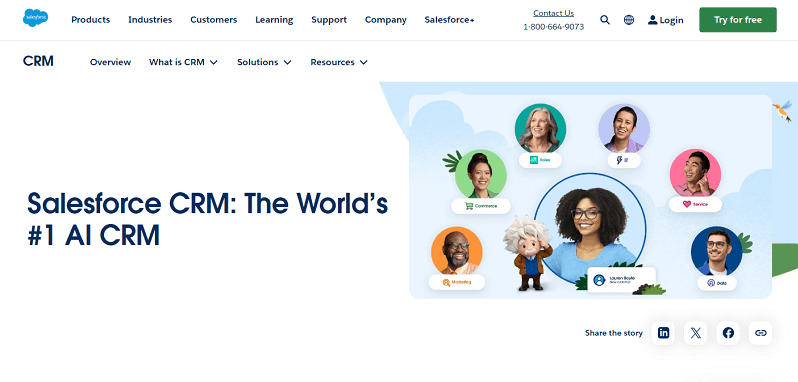
Salesforce is the market leader in CRM software and an ideal fit for the rapidly changing telecom industry. According to data from 2021, Salesforce’s market share was 19%.
Salesforce is a cloud-based CRM software. It offers telcos a flexible and complete way to manage customer data. It offers a central location for all client data, which authorized users can view and update anywhere.
Additionally, Salesforce provides services tailored to the telecom sector, such as SMS messaging, contact center integration, and number portability.
Features of Salesforce
- Contact Management
Salesforce CRM provides access to important client data and interaction history, ensuring hassle-free contact management. It provides a comprehensive image of the client, complete with insights and engagement-boosting tactics.
Businesses can use customers’ social media information to better understand their unique behavior regarding any given good or service.
- Cloud-Based Salesforce Communications
Salesforce Communications Cloud is designed with telecom operators in mind. It provides better network management, service delivery, and customer journey management capabilities. With this technology, telecom providers may provide a connected consumer experience.
- Salesforce Einstein Analytics
Salesforce Einstein Analytics’ sophisticated features help telecom businesses better understand market trends, network performance, and customer behavior. This data-driven approach facilitates strategic decision-making and service quality improvement.
- Mobility
The Salesforce mobile app enables users to access CRM data anywhere and anytime. They get quick access to meetings, events, and account changes.
The application also makes holding conference calls and taking meeting notes easier. The offline data update allows you to work without needing an internet connection. It also makes file and document sharing simple and allows you to work from anywhere.
- File Sync and Share
The Salesforce document management solution allows you to exchange files from any device anytime. It enables internal and external collaboration through versioning and commenting. Users may quickly drag and drop files while maintaining access and control permissions.
Salesforce CRM includes several filters that make finding a specific document in a pile simple. It publishes updated product specifications, pricing lists, and contract agreements.
2. Capsule - Best in Integration
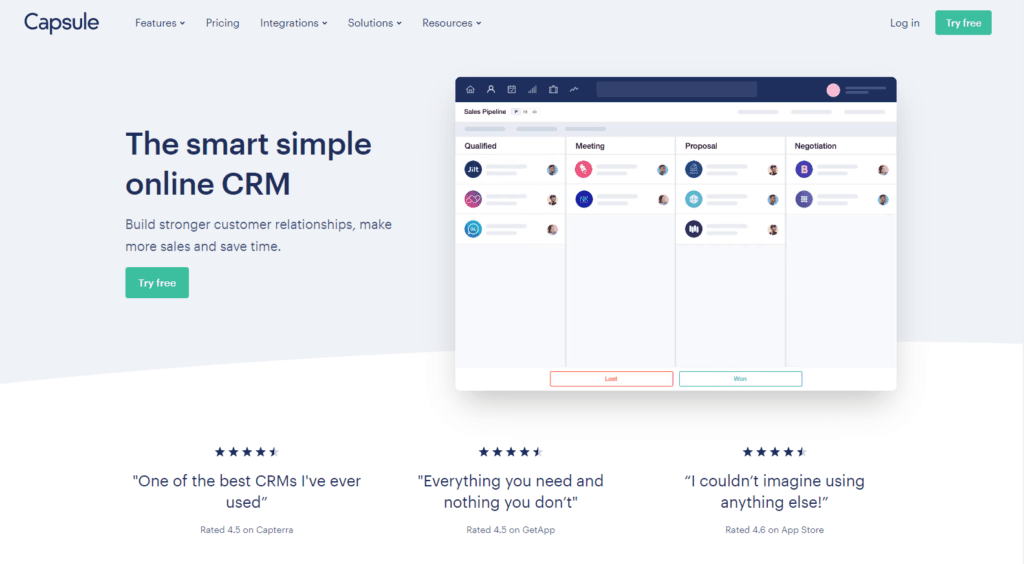
Capsule CRM is a powerful, cloud-based solution built to meet the needs of the telecom industry. Whether you’re managing large volumes of customer inquiries, tracking complex service pipelines, or coordinating sales teams across regions, Capsule offers the flexibility and clarity telecom businesses need to stay ahead.
With real-time contact and pipeline management, teams can track leads, contracts, and projects all from a single, intuitive dashboard. Capsule’s AI content assistant helps sales reps craft targeted, engaging emails to nurture prospects and upsell existing customers in a competitive telecom environment.
Capsule also offers over 60 native integrations, custom tagging and labeling, and workflow automation, giving network providers the tools to streamline operations and scale efficiently. Its competitive pricing and ease of use make it a smart choice for providers looking to improve customer experience and operational control without complex software.
Capsule CRM Features
- Reporting
Capsule CRM provides real-time, visual reporting tools that help track sales performance, team activity, and pipeline progress. It allows telecom businesses to make faster, data-backed decisions and stay on top of service delivery and customer needs.
- Email Tools
With built-in email tools and an AI content assistant, users can craft and send personalized, professional emails directly from the CRM. Capsule CRM helps telecom sales and service teams maintain strong communication with leads and clients at every stage.
- Connectivity
Capsule ensures smooth connectivity across departments and customer touchpoints, centralizing all contact information, communication history, and tasks in one place for better collaboration and customer visibility. It lets you capture leads directly via a form from your website.
- Integration
With over 60 native integrations, including tools like Microsoft 365, Google Workspace, Mailchimp, and Xero, Capsule CRM fits right into your existing tech stack. Capsule allows teams to streamline workflows without switching between platforms.
- Task Management
Capsule’s task management features help teams stay organized by setting reminders, assigning follow-ups, and tracking progress. This is especially valuable for managing customer service timelines and keeping sales processes on track.
- Customization
With Capsule’s flexible customization options, such as custom fields, tags, and automated workflows, Capsule can adapt to your specific business model. Whether you’re managing client accounts or tracking service delivery, the platform molds to fit your processes.
3. Hubspot - Best in free CRM
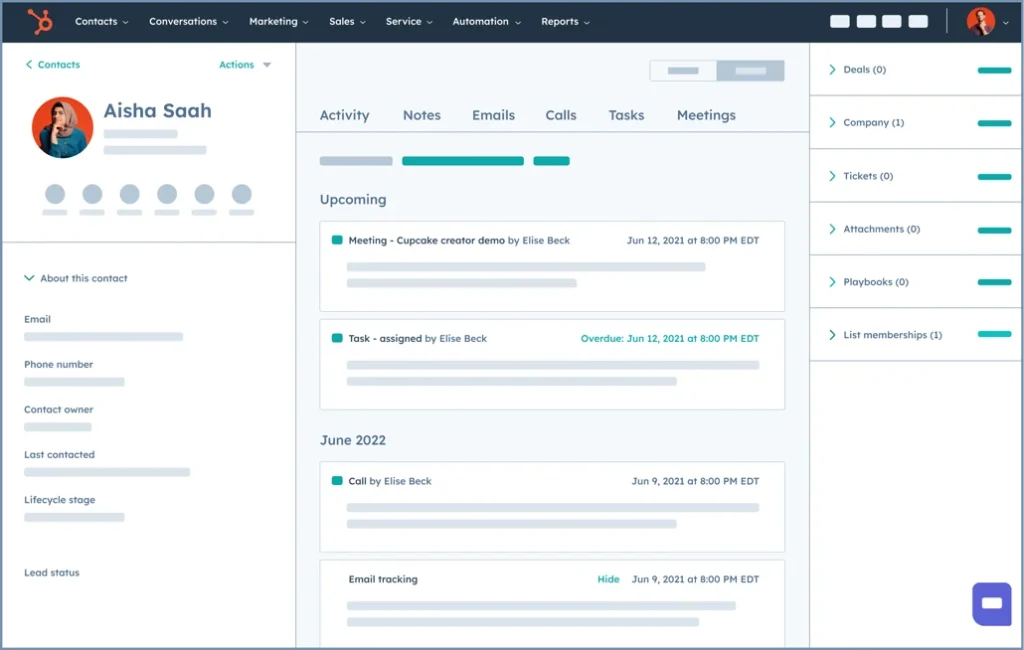
HubSpot is cloud-based software designed to help organizations manage and nurture customer connections. It is user-friendly and suitable for enterprises of all sizes and sectors. The platform’s primary goal is to combine diverse business functions—sales, marketing, service, and operations—into a unified, user-friendly interface.
HubSpot is a CRM powerhouse with a free edition that outshines many paid CRMs on the market. Whether you choose the free or paid version, HubSpot CRM works across marketing, sales, and customer service teams. It’s an excellent option for businesses looking to improve customer relationship management.
Features of Hubspot CRM
- Make new connections and take care of your current clientele.
Telecom companies can improve their marketing efforts with HubSpot’s Marketing Hub, which offers robust, integrated capabilities. Consider this platform your reliable lead generation partner, employing SEO, customized landing pages, and tailored content to draw in new clients successfully. After capturing those leads, you can keep them interested by nurturing them with frequent updates and pertinent content using automated email campaigns.
The smooth integration of HubSpot’s AI-powered CRM streamlines customer relationship management while improving tracking and personalization. Additionally, HubSpot offers comprehensive analytics and reporting that gives you vital information about your marketing effectiveness and consumer behavior. This data can help you improve your results and adjust your methods.
- Improve Customer Experience
HubSpot’s Service Hub improves telecom firms’ customer assistance. The platform’s ticket management system allows teams to track and address client issues effectively, and automated workflows that prioritize and allocate tickets to the appropriate agents guarantee prompt responses.
Customers can use the knowledge base and help desk features to independently find solutions to frequently asked topics, which relieves support staff of some of their workload. Telecom companies may identify areas for improvement with the help of HubSpot’s feedback tools, which include surveys and feedback forms and offer insightful information about service performance.
- Streamlined Reporting
Telecom companies must automate critical procedures and integrate their technology stack to provide a smooth information flow for their teams’ sales, marketing, and customer support activities.
HubSpot’s AI-enabled CRM does more than organize data; it unifies your customer support, sales, and marketing initiatives on a single platform. This integration creates a more unified and efficient approach, freeing your staff to concentrate on their core competencies—providing outstanding customer service and propelling the telecom sector forward.
- Integrate your Sales Motion
HubSpot’s Sales Hub helps telecom companies gain a strong edge. It does this by simplifying sales processes and boosting productivity.
The process of closing a deal can be complicated and time-consuming for many telecom providers. It starts with the first contact and continues until the deal is finalized.
We understand these challenges. Because of this, HubSpot’s set of tools for tracking pipelines and managing contacts is made to help you keep your sales teams organized and your leads under control.
HubSpot relieves you of administrative duties with AI-enabled automation capabilities like meeting scheduling and email follow-ups. When HubSpot’s CRM is integrated, all your customer data is in one place, giving you a clear, thorough perspective.
4. Monday.com –Best in sales Team

Monday.com is a cloud-based project and work management tool designed to track daily work tasks, assignments, and activities and plan and manage projects.
It’s pretty user-friendly, with a straightforward interface, clear instructions, and simple-to-use capabilities that take little time to learn.
Monday.com has a 5/5 rating for data visualization, which includes being one of the most excellent dashboard builders in the business and having a workload view for closely monitoring the status of your project and team responsibilities.
Features of Monday.com
- Customer Service
Monday.com CRM provides simple access to community forums, live webinars, video lessons, online instructions, and direct email customer service. Monday.com’s support staff is accessible around the clock via a straightforward contact form in the program, and you can even send them materials, such as a small video or screenshot.
For instance, you can join one of their live webinars when they happen (forthcoming ones are located in the webinar hub) or get a basic overview by visiting their YouTube channel.
- Integration with other Apps
Monday.com has native integrations with hundreds of third-party apps, or it can do so with a Zapier premium membership. You can link to popular project management platforms such as Trello, Microsoft Teams, Jira, Basecamp, Asana, and Todoist.
Additionally, integration is straightforward. Locate the Integration Center icon in the menu, and you may browse by app type or suggested apps.
- Visualize using charts and dashboards.
Monday.com’s dashboards and charts offer a potent means of transforming project data into aesthetically pleasing and straightforward information. Presenting data more understandably and helpfully makes data analysis easier and enhances decision-making.
Monday.com enables users to design personalized dashboards using widgets like timelines, charts, and figures.
- Keep a time log
Team members can manually or automatically record their time on different tasks using Monday’s integrated time-tracking feature. This helps teams plan better and use resources wisely. It allows them to estimate the time needed for tasks and projects accurately.
Include a time-tracking column in your table. The timer should then be started within the related job. You only need to click once to stop the timer after you finish or pause your task.
- Lead Management
Monday.com’s project management platform offers a robust lead management system that tracks prospects throughout the sales cycle.
You can automate follow-ups and updates for the sales team and rate your leads to choose which ones to follow up on. A sales representative can promptly identify leads requiring follow-up and contact the prospect using this program.
5. Pipedrive -Best in Pipeline Management
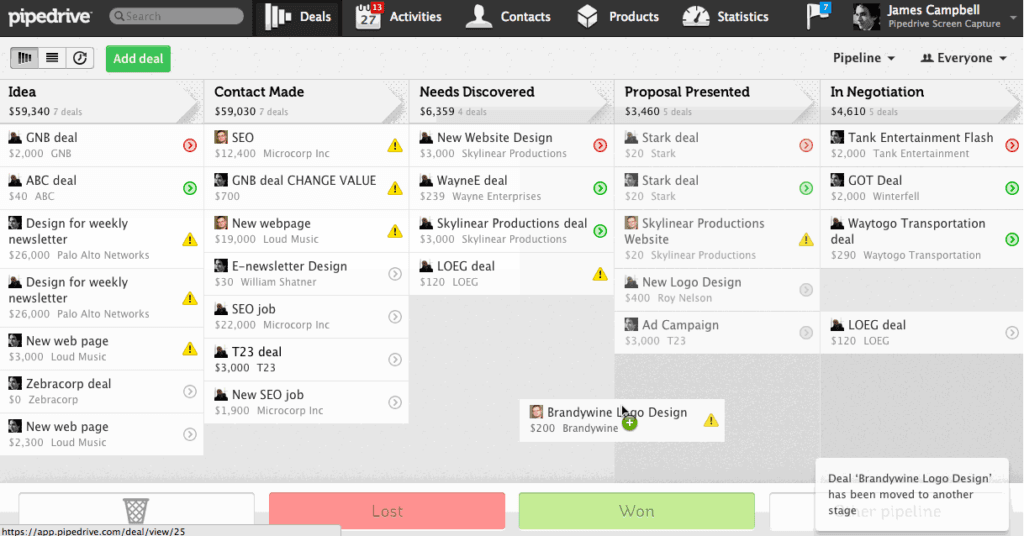
Pipedrive is an easy-to-use sales CRM platform that helps teams of all sizes close more sales. With configurable sales pipelines, real-time data, and robust AI features, it’s no surprise that 100,000 businesses globally use Pipedrive to improve their sales performance.
Pipedrive was created with simplicity and effectiveness in mind. It offers telecom agents a visual sales funnel that is intuitive and simple to use.
Pipedrive succeeds as a pipeline CRM because its user-friendly interface visually maps out your sales process.
This strategy streamlines work management while simultaneously improving team collaboration and decision-making. Pipedrive allows you to personalize your sales stages to mirror your business processes, ensuring that the solution adapts to your needs rather than the other way around.
Features of Pipedrive
- Lead and Deal Management
You call potential deals that you have gathered information about but have yet to close leads in Pipedrive. After qualifying, a team can add a lead to a pipeline.
They can assign a value and choose an owner. Then, they can turn it into a deal. Detailed information, such as contacts, activities, and files, can be connected to each agreement to ensure that all pertinent information is readily available.
- Sales Process Visualization
Pipedrive gives sales teams a visual pipeline view to assess deals’ status quickly. A user-friendly way to manage and monitor the sales process is to drag and drop deals between phases. Pipedrive also offers a timeline view, which makes it simple to see agreements arranged by their anticipated close date.
- Communication and Cooperation
Pipedrive records all correspondence about a contact or a deal. Every action, including emails, phone conversations, and meetings, may be recorded and seen in one location, giving every team member access to the complete context. You may send and receive emails straight from Pipedrive, which also supports email synchronization.
- Ease of Use
With its simple design, users aren’t overloaded with information while viewing leads in aggregate. Sales assistants may spend more time interacting with prospects and closing deals since the platform uses artificial intelligence (AI) to streamline the process. To help the team concentrate on leads that will produce outcomes. Pipedrive uses a Kanban-style board to drag and drop leads through the sales cycle.
- Customization
Pipedrive lets you customize the platform to meet your needs, whereas most CRMs give you some degree of customization. For example, users can create automation that supports their business and customization requirements and modify data fields to meet their needs. Remember that you will require a developer to exploit the API and webhook customizations fully. These tools can help the team operate more efficiently.
6. Freashsales - Best in Lead Management
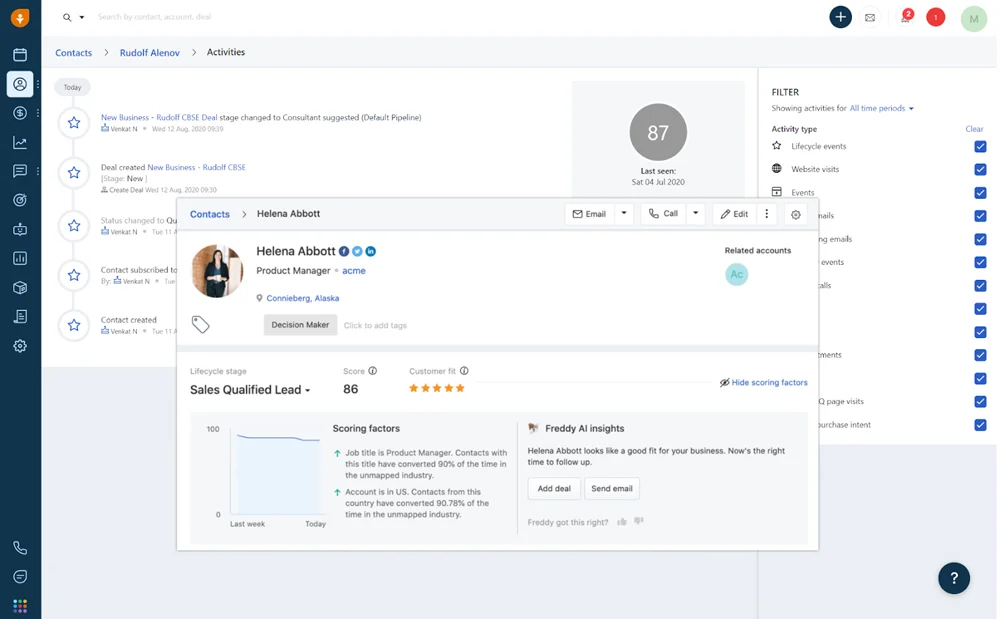
Freshsales is a comprehensive solution that offers integrated phone, chat, marketing, and sales features. Using a browser or mobile app, you can easily refer to or add contacts to the Freshsales CRM from anywhere at any time.
Additionally, the software is completely customizable, so you can alter your dashboards to fit your preferred way of viewing contacts or data. These and other factors led to its inclusion on our list of the top CRMs for the telecom industry.
FreshSales helps you manage your sales process. It does this by organizing, tracking, and following up on leads. It also helps you build connections with customers. The all-in-one view feature lets users view all past engagements, customer touchpoints, and prospects
Freashsale Features
- Contact Management: Freshsales makes accessing and editing records simple by enabling centralized customer information management.
- Lead Management and Scoring: The system offers a creative method of scoring leads, assisting sales teams in tracking and prioritizing possible prospects.
- Sales Pipeline Management: Freshsales’s simple sales pipeline visualization allows salespeople to monitor deal progress at every level.
- Email Engagement and Tracking: The application incorporates email tracking capabilities, offering insights into click-through rates and openings.
- Event tracking: This function assists organizations in monitoring customer behaviors by providing valuable insights into consumer behavior and preferences.
- Analytics and Reporting: Freshsales has several reporting capabilities that provide comprehensive data to assist companies in making wise choices.
7. Netsuite - Best in Support
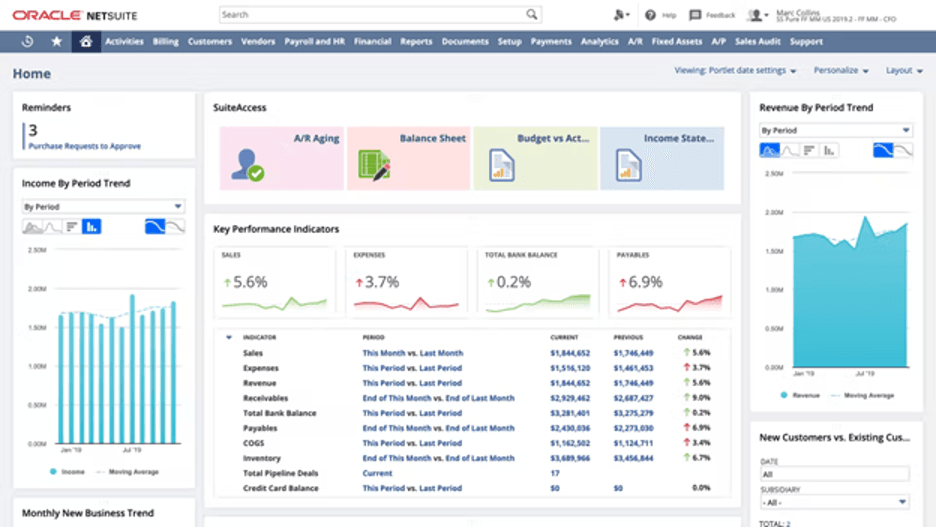
NetSuite CRM software provides a real-time 360-degree picture of your clients. Throughout the whole customer lifecycle—from leadership to opportunity, sales order, fulfillment, renewal, up-sell, cross-sell, or support—NetSuite CRM offers an uninterrupted flow of data.
One of the earliest cloud-based CRM systems, NetSuite, has evolved over the past few years. With configurable workflows, this multi-tenant SaaS solution aids in the speedier growth of small and medium-sized businesses. With cloud-based apps that boost organizational productivity, NetSuite offers unparalleled insight and control over the whole company.
Features of Nesuite
- Enterprise Resource Planning
NetSuite gives organizations total command over their data and resource allocation. You may use NetSuite’s ERP to automate all manual processes, from managing financial operations to processing order-related data. ERP gives a detailed picture of every business process, which can boost an organization’s productivity.
- Global Business Management
NetSuite’s international business management offers unparalleled real-time operational visibility. It enables multinational corporations to handle the difficulties brought on by tax laws, currency fluctuations, and regulatory compliance. GBM facilitates the consolidation of these businesses in regional areas while maintaining the business’s core values.
- SuiteCommerce
NetSuite enables e-commerce companies to manage online orders centrally, decrease processing time, and improve accuracy by automatically updating them to the backend. SuiteCommerce connects the front and back end. This helps B2B and B2C websites remove tedious tasks and boost customer engagement.
- Timesheet Management
NetSuite helps project managers keep track of employees’ working hours and evaluate time-based assignments. To obtain a summary of performance, you can view pertinent data such as “Start Date,” “Work Done,” and “Estimated completion time.” Additionally, you can use timesheet management to redistribute work to complete projects quickly.
8. Creatio - Best in Order Management
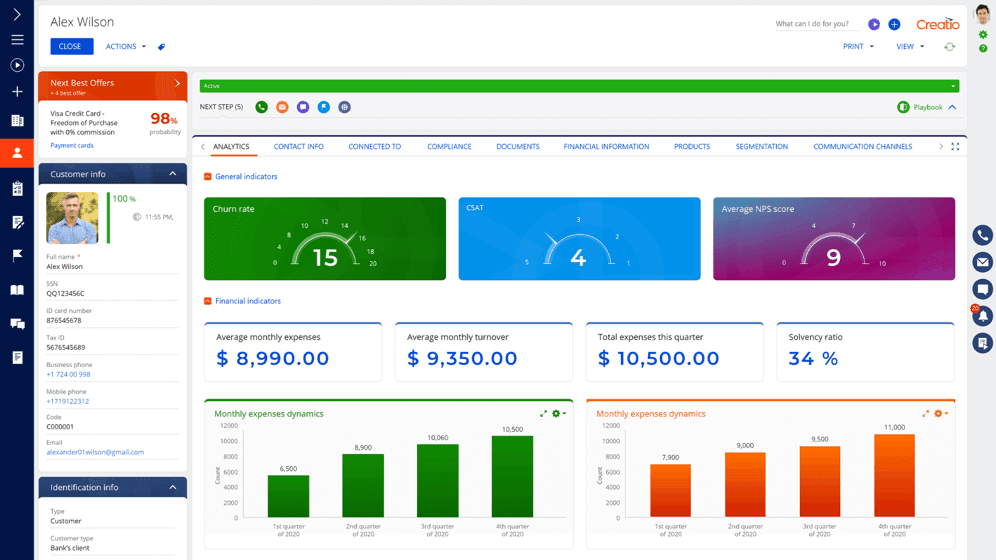
Salesforce is a top cloud-based CRM software provider in the international market. The Salesforce CRM requires no technical knowledge to set up or manage. It is an ideal tool for outside sales reps, giving them a complete view of their pipeline and understanding how their business is doing. It tracks the journey of leads in the pipeline to check whether they are reaching their destination.
Integrating third-party apps can open up a new range of ideas you didn’t previously have. These ideas can be translated into new services. As a Salesforce CRM user, you can easily connect to other applications through third-party integration. You can connect to Google Drive, DocuSign, LinkedIn Sales Navigator, Google Ads, MailChimp, HubThunder, Adobe Sign, PandaDoc, and many more with REST services.
The only negative aspect I’ve encountered while utilizing Salesforce is that saving entered data is not done automatically and can lead to losing work.
Features of Creatio
- Customer 360 view
With Customer 360, users of Creatio can see every contact and account in detail. Contact details, notes, sales histories, and summaries of all previous exchanges are included. This customer view monitors engagement scores and continuous communications by obtaining customer data from omnichannel sources.
- Opportunity tracker
The opportunity tracker is available for full-cycle lead management for Creatio users. This usually includes lead generation, distribution, processing, and contract closing. Creatio goes one step further by providing more sophisticated tools like custom pipeline development and automation. In this manner, customers may see the precise stage of a deal in their sales process and know what has to be done.
- Order Management
Creatio provides various solutions for managing contracts and orders, including omnichannel order tracking. This allows users or administrators in charge of product distribution to see everything on a single dashboard. Other features include omnichannel order processing, quote production, document sharing, comprehensive product catalogs, and history tracking.
- Campaign management
With the help of Creatio CRM software, staff members may segment the audience and create new automated campaigns that enable communication with current or potential clients. Campaign management offers a range of tools to implement, develop, evaluate, and improve multichannel marketing.
9. Microsoft Dynamics – Best in Managing Finance
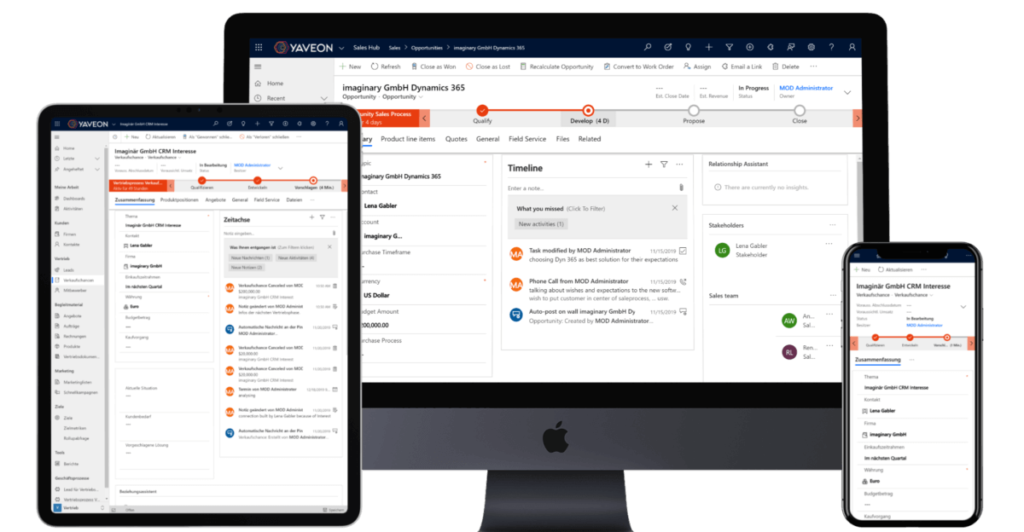
Microsoft Dynamics is the ideal program for integrating customers, goods, personnel, and operations into one application with countless implementation choices. It is a payment tool; to fully utilize it, you will need some training time. This utility requires some programming experience. But if you know how to use it, you’ll be able to easily integrate and simplify corporate procedures, enhancing customer relations and promoting expansion.
It provides a clear picture of the success of sales and marketing initiatives through automatic and sophisticated data analysis.
Features of Microsoft Dynamics
- Unified Communications: Dynamics 365 streamlines the sales process and enables you to communicate with clients via “Microsoft Teams.” You can communicate any valuable offer or detail, call meetings, and converse in a minute.
- Advanced AI tools: Dynamics 365’s AI-powered capabilities allow you to forecast revenues based on the most recent marketing strategy and conversion rate. Depending on your needs, it can also create income, automate activities, perform 360-degree data analysis, and much more.
- Managing finances and operations: Dynamics 365 has a tool for financial analysis. It helps you track all transactions and manage your operations. Credit card information can be stored, tasks can be annotated, and new hires’ training can be expedited. Additionally, Dynamics 365 facilitates a seamless transition of complex workflows on the CRM.
Visual editor: Dynamics 365 simplifies performance measurements by enabling the creation of charts, graphs, and organizational workflows. You can receive several perspectives on business development and adjust the settings.
10. Zendesk - Best in Adaptability

Zendesk is among the top suppliers of CRM software. It provides various products and solutions for companies of various sizes. We believe that Zendesk stands out from the competitors due to its adaptability and wide range of use cases.
Additionally, before purchasing, you can test Zendesk’s software with its robust free trial. Furthermore, its use by well-known companies like Slack, Shopify, and Uber should be obvious.
Features of Zendesk
- Analytics & Tracking of Visitors
Zendesk provides users with analytics and visitor tracking tools to help them understand how users interact with their website or mobile application. Thanks to the software’s integrated reporting features, organizations can monitor important customer support metrics, including response times, resolution rates, and customer satisfaction.
You can use these statistics to understand your visitors’ needs, preferences, pain spots, and expectations. Additionally, you can identify possible leads for proactive engagement and customize your marketing and support campaigns.
- Omnichannel Approach
Zendesk’s omnichannel strategy enables users to monitor and manage customer interactions across many channels, including chat, social media, email, and messaging applications. This enables users to give clients a uniform and cohesive experience across several touchpoints.
- Customer Service
Zendesk offers its users excellent customer service. With an average first response time of 24 hours, their support staff is helpful and accessible around the clock.
Depending on their plan and area, users can reach the support staff by phone, email, or live chat. To receive a callback or response, you must first submit a support request ticket via the Zendesk platform.
- The User Interface and the User Experience
The user interface is simple and easy to use, with features including ticket forms, workflows, automation, triggers, and macros to help agents quickly handle and resolve client issues.
Zendesk enables users to tailor the program to their own needs and preferences. It also provides a simplified onboarding process, including webinars, videos, and guided tutorials to help users get started immediately.
Why CRM Is Important in Telecom Industry
The telecom sector has particular difficulties, including complicated service offerings and fast-evolving technologies. CRM is essential to handling these issues. In the telecom industry, CRM is necessary for the following reasons:
- Reducing Customer Attrition
This happens when customers switch to a competitor because of pricing or service issues.
- Personalized Interaction with Customers
Today’s telecom consumers demand experiences customized to meet their unique demands, not just dependable network service. CRM solutions allow telecom companies to divide their clientele according to their tastes, habits, and usage patterns. Telecom companies can use this to provide specialist support, recommend appropriate service upgrades, or launch focused marketing efforts.
- Enhanced Customer Service
Customer service is one of the most important ways to stand out in the telecom sector. CRM brings all customer data together. This allows support staff to see a client’s past and current services.
They can also view any ongoing issues. This results in increased customer satisfaction and quicker resolution times. When handling billing queries or resolving technical problems, CRM ensures that customer support representatives have all the tools they require close at hand.
- Increasing Revenue and Sales
CRM is used by telecom businesses to increase cross-selling and upselling. By examining client data, sales teams can find the best candidates for extra services or premium plans.
CRM software for telecom helps introduce new products, service upgrades, and long-term contracts. They provide useful insights about client preferences and needs. These actions all contribute to revenue development.
Final Thoughts On The Best CRM For Telecom industry
The best CRM for telecom companies must meet the sector’s unique needs. It should manage large customer bases and handle complex invoicing systems.
Additionally, it must ensure smooth communication across many channels. It must also go beyond conventional customer care tools. Telecom CRM solutions should offer real-time problem-solving and personalized customer engagement. They must also provide strong data analytics to boost customer satisfaction and loyalty.
Improving operational efficiency and providing a customized customer experience requires vital elements like omnichannel integration, AI-driven analytics, automated workflows, and targeted marketing capabilities.
Using a CRM system helps telecom companies offer proactive, efficient, and personalized service. This is essential as competition increases and customer demands grow.
The right CRM can change how telecom companies manage customer relationships. It helps them meet and exceed client expectations. This can reduce customer loss and support steady growth in a constantly changing industry.


























